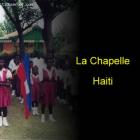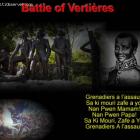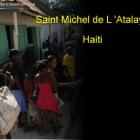ADVERTISEMENT
Voodoo
Pictures taken from Haiti Voodoo related issues. Haiti is internationally known for its voodoo religion which is part of its culture. We show ceremonies, practices, believe,. the phenomenon of zonbification and more
Obeah is to Jamaican what Voodoo is to Haitian
After the government of Jamaica abolished colonial-era punishments, the Obeah believers are optimistic that decriminalization of the Obeah practice will follow. The practice, which is similar in so many ways with the Haitian Voodoo was banned hundreds of years ago by the Jamaican government. Those who attempted the practice have been flogged or thrown to prison among other forms of punishment.
The idea to decriminalize a practice considered as black magic by many is already receiving criticism from many Christians in Jamaica. Jamaica is claimed to have the highest ratio of churches to citizens in the globe. In Jamaica Christianity is the dominant religion with people gathering in wide range of structures-wooden holding a small number of congregants to mega structures holding thousands of believers.
Haoussa or Hausa Mystery in Haitian Culture, Is It True Or Not?
Houssa phenomenon is popular among Haiti businesses. This phenomenon is believed to have occurred when businesses suddenly and mysteriously lose money. There are many instances and stories told about certain Houssa people coming in to a store and buying something. They will pay in cash and get change from the seller. However, once they are gone, the seller would notice that they lost money and that their earnings do not add up. Many businesses experiencing losses blame it on the Houssa phenomenon.
However, is it really the main cause of losses? There are others questioning the truth behind the Houssa phenomenon, citing other possible reasons why businesses might have lost their sales. Mismanagement of the business is one reason. There are businessmen who fail to record all the transactions that happened in the day. Instead of recording it on paper, they try to keep the transactions in their memories, which they can forget at the end of the day.
Pierre Jenty orchestrates a Sham Voodoo Curse Bilks $20,000 out of Victim
A New York woman, believing she'd been hexed, sought services of a Voodoo practitioner, Pierre Jenty, in Miami Florida. Sixty-six year-old Jenty, a con artist, scammed upwards of $20,000 dollars out of her. It came to a violent end when she came up short of money on her last trip to him. She was drugged and raped.
The unidentified victim was a Haitian Voodoo believer. Voodoo, an integral part of Haitian culture, was brought to Haiti by Congolese slaves. When European colonists settled in Haiti, Catholicism became the dominant religion, forcing Voodoo underground. But Voodoo priests adopted Catholic practices, and the religions have co-existed peacefully since.
Anna Pierre, candidate for mayor of North Miami, threatened with Voodoo dolls
Mayoral candidate from North Miami, Anna Pierre, is one among eight people fighting for the post. Anna Pierre is a popular figure. She is a well-known nurse and a singer. Mete Suk Sou Bonbon - her hit song of the 1990's scaled up her popularity. She asked people from 3 countries to pray for her because there is someone who is using anonymous calls from blocked numbers along with sinister sorcery to prevent her from becoming mayor. Anna Pierre said that she found needle poked small dolls and ample amount of pennies in front of her office and being a person from Haiti, she knows the meaning of those things. She indicated towards voodoo practices being used by someone to throw her out of the race. Anna said that people from U.S., Canada and Haiti are praying for her and that she is not afraid because Jesus is with her.
What is a Hounsi in Haitian Voodoo
Within Voodoo, an initiation process, which calls the prospective initiates to a higher plane of enlightenment, is performed in the oumfo or temple. Iwa is the supreme divinity, one of a thousand gods that is wooed to take possession of the initiate's body to impart secret knowledge and spiritual nourishment.
Initiation begins with participation of the initiate in Voodoo services. By their involvement, they become ounsi bosal, helpers to the hougan (priest), and/or mambo (priestess) during oumfo or temple services. The initiate is then chosen and prepared to experience Iwa through a ritual head washing. This rite confers the term ounsi lave tete on them.
The Mystique Lakou Souvenance Experience
As one reaches Souvenance, for the Rara annual festive season, one has to pass the crossroads or Kalfou that goes towards Badjo and Soukri. The roads are dusty. Rara season is at its height on 21st March, Good Friday. Formidable crowds make up each Rara.
On Reaching The Rara
The front is led by flag bearers and the colonel keeps whipping and whistling to keep everyone in order. Wearing bright matching veils and dresses, the brides follow.
European military drums, Petwo, Klewon and Banbou and horns in metal are played by musicians besides other percussion instruments. Female singers sing in chorus and the rest of the crowd participate drinking kleren or rum, singing and dancing.
Mario Dupuy at Lakou Soukri during Guede Festival
The Haitian Minister of Culture, Jean Mario Dupuy celebrated the Lakou Soukri kings on the occasion of Guedes, the traditional festival in Haiti. This is just two months after returning to Gonaives from his visit to Lakous.
Mario Dupuy Marks His Presence
Shella Tanisma, the Empress and Marie Carme Delve, the servant, welcomed the Minister as per the rituals. Mario Dupuy stated that his presence amongst the people was a testimony to his commitment to the Republic's President, Michel Martelly, the government and Laurent Lamothe, the Prime Minister and that it demonstrates how important voodoo religion was in Haiti.
Lakou Souvenance, Soukri and Badjo during Guede Festival
The three most popular Voodoo sites in Haiti are Lakou Souvenance, Soukri and Badjo. These 3 houses are among the oldest in Haiti with large membership of voodoo practitioners performing authentic African traditions. Souvenance is known for Rada, Soukri tractices Petro and Badjo practices Nago
These Voodoo sites attract foreigners and locals in large numbers. In the past, this site would attract visitors from all over the world when they are having their annual festival. The Haitian government sees a possibility for the three Voodoo sites to attract tourists thereby help the country to generate additional revenue.
Michel Martelly Visits Lakou Souvenance, Soukri Danach and Badjo
In the objective to support the Haitian Voodoo, Haitian President Michel Martelly visited three "Lakous" in the Artibonite Department on january 13, 2013: Lakou Souvenance, Lakou Soukri Danach, Lakou Badjo.
Martelly conducted the visits with an initiative coming from Culture Minister, Mario Dupuy. He entered inside of the Peristile of Souvenance with a Candle and a cup filled with water and and proceed to do the ritual called "Jete Dlow". The Haitian President received the benediction of the Haitian Voodoo priests or as they are called Houngan.
What is Souvenance?
Souvenance is one of lakous in the Artibonite region that are known for keeping a specific African Voodoo traditions. Lakou Souvenance celebrates the lwas originated from Daome which is called Benin today. Lakou Soukri Danach is known for celebrating the African Kongo tradition. Lakou Badjo has kept the Nago tradition of Yoruba.
Legal Expert Says 2011 Constitution Does Not Endanger Voodoo Faith
An on-going debate over whether the practice of voodoo is being threatened by the amended 1987 Constitution has stirred the embers of its practitioners' fears.
Voodoo, brought to Haiti by Congolese slaves, became entrenched in Haitian culture, early in its history.
In 1935, under the rule of Stenio Vincent, the 1935 Decree Law defined voodoo as a superstitious belief system and banned the practice of it. For over 50 years, the Decree Law was not tampered with. By 1987, though, the amended Constitution struck down the Decree Law with Article 297, invalidating the definition of voodoo as a superstitious practice. A presidential decree on April 4, 2003, further legitimized the voodoo faith. But in May 2011, Article 297 was annulled, and has given rise to fears that voodooists would suffer persecution for their beliefs.
Our objective is to share with you news and information about Haiti and the people of Haiti. Traditions, habits and the way we were or grew are alive in this site. We highly recommend that you Subscribe to our Newsletter and also share with us some of the things that are memorable and made us unique people.

 Life After Death
Life After Death  La Chapelle, Haiti
La Chapelle, Haiti  Haitian Thanksgiving
Haitian Thanksgiving  Battle of Vertieres
Battle of Vertieres  Saint Michel de L 'Atalaye
Saint Michel de L 'Atalaye